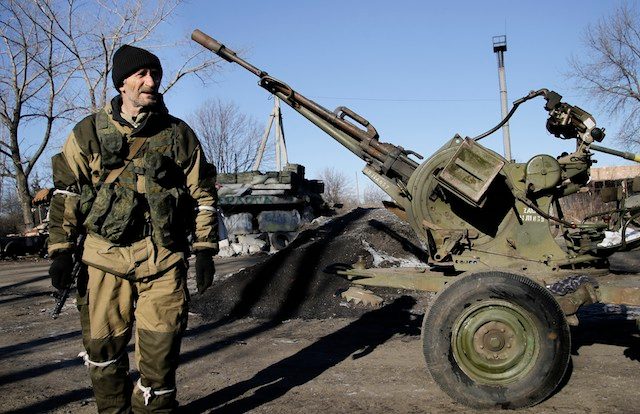SUMMARY
This is AI generated summarization, which may have errors. For context, always refer to the full article.

KIEV, Ukraine (UPDATED) – Ukraine’s army and separatist rebels appeared Sunday, February 22, to be complying at least partially with their truce accord, saying they will start pulling back heavy weapons from the frontline after carrying out a prisoner exchange.
But ongoing breaches of a week-old ceasefire – especially by the pro-Russian rebels, who overran a strategic town in a bloody offensive – have already prompted a threat from the United States of “serious” new sanctions against Moscow within days.
An Agence France-Presse journalist in the eastern rebel stronghold of Donetsk heard intense shelling for an hour early Sunday to the north of the city, near the regional airport that fell to the rebels a month ago after fierce battles.
Fears were also rising over Mariupol, a government-held port city that is rapidly becoming another flashpoint. Continued shelling has been reported there and Kiev alleges that 20 Russian tanks have been deployed towards it.
Despite those hostilities, Ukrainian officials and the separatists said they have jointly agreed to finally start the pullback of heavy weapons – a step meant to have begun on Tuesday and completed by March 3 under the truce.
“The papers have been signed to begin withdrawing heavy weapons all along the frontline,” Ukrainian General Olexander Rozmaznin told Agence France-Presse.
The rebel leader of the self-proclaimed Donetsk republic, Eduard Basurin, said via the separatists’ news agency that “preparatory work” for the withdrawal would be carried out before the actual pullback starts on Tuesday, with the process to be finished by March 7.
Skepticism over truce
In another sign that both sides in the conflict might now be willing to apply the truce, or at least parts of it, an overnight prisoner exchange took place in which 139 Ukrainian soldiers were traded for 52 rebel fighters.
Some of the soldiers struggled on wooden crutches across a war-torn landscape in the frontline town of Zholobok, near Lugansk, with support from their comrades.
One freed insurgent, Roman Biarinov, said he was going to get married and then return to the fight.
“We have to defend this land. We are going to win. I don’t know how, but we will win,” he said.
Skepticism reigns over whether the ceasefire will fully take hold, especially after a rebel assault Tuesday and Wednesday on the strategic town of Debaltseve, a transport hub between Donetsk and the other main rebel city of Lugansk.
The offensive killed 179 soldiers over the past month, according to one Ukrainian presidential aide. Some 2,500 Ukrainian troops had to flee Debaltseve under heavy rebel fire.
US threat of more sanctions
The Debaltseve rout and other ceasefire breaches have drawn a furious reaction from the United States, which blames Russia for the 10-month conflict despite Moscow’s repeated denials.
“If this failure continues, make no mistake, there will be further consequences including consequences that will place added strains on Russia’s already troubled economy,” US Secretary of State John Kerry stormed during a press conference in London on Saturday, February 21.
He believed US President Barack Obama would “in the next few days” decide on “additional steps (that) will be taken in response to the breach of this ceasefire”. He predicted “serious sanctions” could be imposed.
The United States and the European Union have already imposed several rounds of sanctions on Russia.
In a further show of solidarity with Kiev’s pro-Western government, several European leaders were on Sunday to take part in a “Dignity March” in the Ukrainian capital marking the first anniversary of the toppling the country’s pro-Kremlin president after bloody street protests.
The event was to include EU president Donald Tusk, along with the presidents of Germany, Lithuania, Moldova and Poland, according to Kiev officials. – With Stephane Jourdain in Donestk, Agence France-Presse / Rappler.com
Add a comment
How does this make you feel?
There are no comments yet. Add your comment to start the conversation.